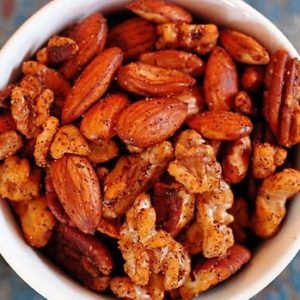Makes: 4 cups
Active Time: 20 minutes
Total Time: 20 minutes
(Low carbohydrate, Low cholesterol, Low saturated fat, heart healthy, Gluten free)
Ingredients
- 1 pound (500gms) pecan/walnut halves (or mixed nuts)
- 1 tablespoon packed dark brown sugar
- 1 1/2 teaspoons iodised salt
- 1 teaspoon chopped fresh thyme
- 1 teaspoon chopped fresh rosemary
- 1/2 teaspoon freshly ground pepper
- 1/2 teaspoon paprika or a large pinch of cayenne pepper (vary to taste)
- 2 tablespoons extra-virgin olive oil
Preparation
- Preheat oven to 350°F.
- Spread nuts on a large baking sheet. Roast until fragrant, about 12 minutes. Watch carefully so they don’t burn.
- Combine brown sugar, salt, thyme, rosemary, pepper and paprika (or cayenne) in a small bowl. Transfer the roasted pecans to a large bowl, drizzle with oil and toss well to coat completely. Sprinkle with the spice mixture and toss again. Serve warm or let cool completely and store in an airtight container.
These can be made ahead and stored in an airtight container for up to 2 weeks.
Note: Experiment with spices to achieve the taste you like best.
Nutrition
Per 2 tablespoon serve: 107 calories; 11g fat (1g saturated, 6g mono); 0mg cholesterol; 2g carbohydrates; 1g protein; 1g fibre; 53mg sodium; 58mg potassium.
From https://www.brainfit.world
More about Brain-Healthy Spices
Many herbs and spices contain nutrients that have been linked to brain benefits, and ongoing research is adding to the list of their positive effects. The seasonings most likely to be featured in cakes, cookies, breads, and favorite savory dishes served over the holidays are described below.
(This information is sourced from publications from the National Institute of Health, USA.)
Cinnamon
The bark of a tree native to Southeast Asia, cinnamon has been shown to have antioxidant, antidiabetic, and antibacterial properties. An animal study published in the July 2015 issue of Nutritional Neuroscience found that an extract made from the spice helped protect lab rats from cognitive impairment and brain damage associated with oxidative stress. Brain benefits associated with cinnamon consumption in humans include reduced inflammation, improved memory, increased attention, and enhanced cognitive processing.
Serving ideas:Sprinkle cinnamon into your coffee, add it to fresh fruit, or mix it into your breakfast oatmeal. Better yet, enjoy a cinnamon bun!
Nutmeg
Nutmeg grows on a type of evergreen indigenous to Indonesia. The spice contains various compounds that boost mood, help relieve pain, and relax blood vessels and lower blood pressure. Some research suggests that a nutrient found in nutmeg may help slow cognitive decline in individuals with Alzheimer’s disease and promote the recovery of brain tissue following a stroke. Sprinkled in warm milk, it appears to help induce sleep.
Serving ideas:Great with baked goods, or added to egg dishes, casseroles, and even burgers. Try adding it to brown rice, or grating it over whipped cream.
Cloves
Made from the dried flower buds of the evergreen clove tree, cloves are also native to Indonesia. The spice is loaded with antioxidant power. Research comparing clove with more than 1,100 other foods found that it had three times the antioxidants of the next highest source, dried oregano. Cloves are also a natural anti-inflammatory and antimicrobial agent, a local anesthetic, and have been found to have antifungal properties. A compound found in cloves has been shown to be 29 times more powerful than aspirin in helping to prevent blood clots.
Serving ideas: Delicious added to baked goods, cooked grains, bean soups and chili, applesauce, smoothies, and cooked cereals.
Ginger
This spice, made from the root of the ginger plant, has been shown to be an effective pain reliever, with active compounds that resemble those of capsaicin, another well-known pain reliever found in hot peppers. The spice also helps reduce nausea, control inflammation, counters the activities of cell-damaging free radicals, acts as a blood thinner, and has been found to help protect brain cells from deterioration associated with Alzheimer’s. A 2012 study involving 60 middle-aged women found that a daily dose of 800 mg of ginger extract helped improve working memory and attention.
Serving ideas: Use grated fresh ginger in salad dressings and marinades. Cook ginger with vegetables, such as squashes, sweet potatoes, and green beans. Add ginger powder to baked goods, tea, or fruit smoothies.
Cardamom
A relative of ginger and turmeric, cardamom has shown antibacterial properties, and antioxidant properties that help protect brain cells from free radical damage. A study published several years ago in the Indian Journal of Biochemistry and Biophysics found that consuming just ½ teaspoon a day for three months along with a healthy diet helps normalize blood pressure and lower risk for stroke by relaxing the arteries and the muscles of the heart.
Serving ideas: Brew your coffee or tea with cardamom, add it to stews or soups, or sprinkle it into batters and dough for tasty baked goods. It’s also delicious with smoothies and hot breakfast cereals.





My Swiss mother-in-law always grated fresh nutmeg onto mashed potatoes then stirred it in. My husband adores this.
My cousin puts 2-3 whole cinnamon sticks into bottles of water then stores them in the fridge. Makes a very refreshing drink and the sticks can be reused many times.
These are excellent suggestions! Thank you – I will definitely try these tips.
Dear Gillian, This is my third attempt to finish this email. Not your fault it is my fingers which are a bit clumsy, but not bad for 90 years of use. I have kept all your postings in my computer, they have been very useful and enjoyable. Thankyou. The helpful tips on spices are very good and I will share them with my wife, Ruth. Please enjoy your Christmas and New Year festivities. We will certainly do that. Peace and joy be yours.
Yours thankfully,
Robert Jackson.
Well done on persevering, Robert! We really appreciate your kind words and I am so glad you are finding our articles and tips helpful. Lots more to come next year! Have a lovely Christmas from all of us at the Memory Foundation
Late opening last mail but very interested in the news of spices. I have been a fan for years especially ginger which is so good for nausea and still use cloves and cinnamon and others but didn’t realise they had such wonderful properties. I will certainly keep on as anything that might improve cognitive ability must be good. A Very Merry Xmas to you and a Happy Holiday. Look forward to next years words of wisdom and meantime will try to get that guy over the bridge a little faster!!!!!